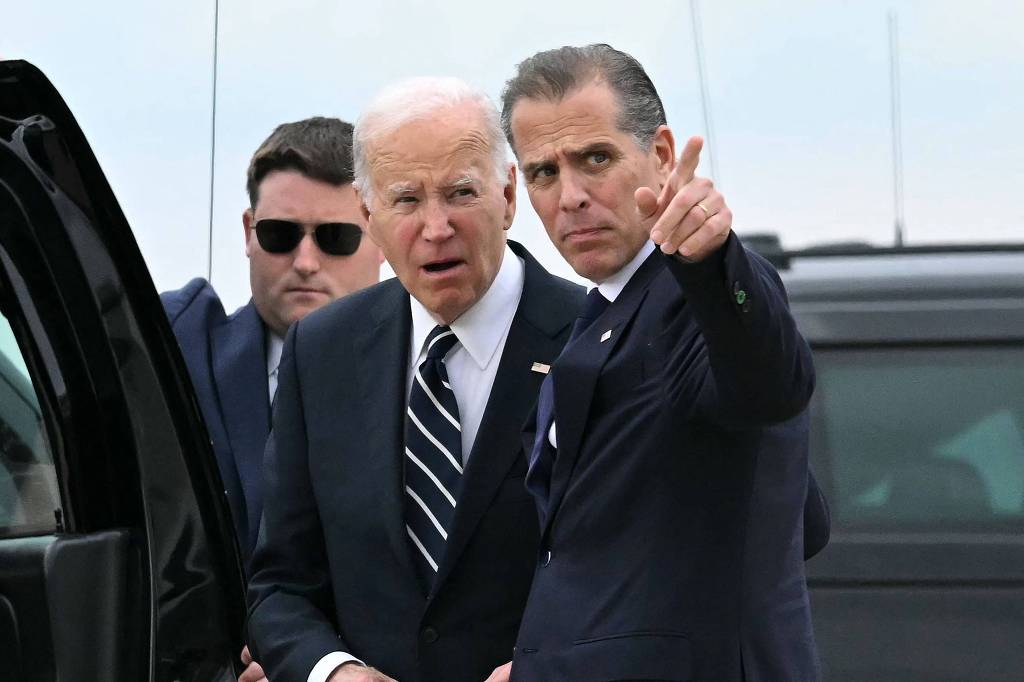
Published 12/02/2024 11:19 | Edited 12/02/2024 11:20
US President Joe Biden and his son, Hunter Biden, at a military base in New Castle, in the state of Delaware Photo: Reproduction
The outgoing president of the United States, Joe Biden, granted this Sunday night (1) a “total and unconditional” pardon to his son, Hunter Biden. The measure prevents his first-born from suffering a possible conviction in two cases, which together could exceed 42 years in prison.
Previously, the US president had repeatedly denied that he would grant his son a pardon for his convictions related to illegal gun possession and tax evasion or commute his sentence, which was scheduled to be announced this month.
By taking this measure, apparently turning off the lights on his political career, Biden follows the bad example of former president Donald Trump, who, near the end of his last term, in 2020, granted a pardon to Ivanka Trump’s father-in-law, Charles Kushner. Charles is the father of Jared Kushner, a former senior adviser to the Trump administration.
When announcing his decision to pardon his son, Joe Biden stated that, although he believed in the justice system, “politics infected this process and led to a miscarriage of justice.”
“Today, I signed a pardon for my son Hunter. From the day I took office, I said I would not interfere in the Justice Department’s decision-making and I kept my word, even though I saw my son selectively and unfairly prosecuted,” the president said in a statement.
Biden claimed that although he believed in the justice system, “politics infected this process and led to a miscarriage of justice.”
“Without aggravating factors such as use in a crime, multiple purchases, or purchasing a gun as an undercover purchaser, people are rarely brought to trial on felony charges simply because of how they filled out a gun ownership form. Those who were late in paying taxes due to serious defects, but later paid with interest and penalties, generally receive non-criminal resolutions. It is clear that Hunter was treated differently”, explained Biden.
“No reasonable person examining the facts of Hunter’s cases can come to any conclusion other than that he was chosen specifically because he was my son – and that is wrong. By trying to destroy Hunter, they tried to destroy me – and there is no reason to believe that this will stop here. That’s enough….”, he concluded.
The decision comes weeks before Hunter Biden is scheduled to receive his sentencing in the gun case and his guilty plea on tax charges, and less than two months before President-elect Donald Trump returns to the White House.
In June of this year, Biden stated that he would not pardon or do anything to reduce his son’s sentence: “I respect the jury’s decision. I will do this and I will not forgive him.”
Hunter was convicted in June in federal court in Delaware of three felonies related to a 2018 gun purchase when, prosecutors say, he lied on a federal form when he declared that he did not use drugs illegally or have an addiction.
In the tax evasion case, he was scheduled to go on trial in September in California, accused of failing to pay at least $1.4 million in taxes. However, he agreed to plead guilty to misdemeanor and felony charges in a surprise move hours before jury selection was to begin.
The tax charges carried up to 17 years in prison, while the weapons charges could result in up to 25 years in prison, although federal sentencing guidelines called for much more lenient sentences, making it possible for him to avoid prison altogether.
The American newspaper “The New York Times” states that there have been more times when a president has used his executive power to pardon or mitigate the sentence of a family member. On his last day in office, former President Bill Clinton pardoned his brother Roger Clinton over past allegations of cocaine use.
However, the newspaper points out that both Roger Clinton and Kushner, in the case of Trump, had already served their prison sentences when the pardon was granted.
Source: vermelho.org.br

